This Jamsetji Tata Trust supported project on ‘Sustainable Livelihoods through Organic Farming in Tamil Nadu’ was implemented in Kancheepuram, Ramanathapuram, Dindigul and Nagapattinam districts from May 2009 onwards. The main objective of the project is to create livelihoods through organic farming for small and marginal farmers in Tamil Nadu and to make agriculture sustainable through organic farming.
Project activities were implemented in 36 villages of Kancheepuram, Nagapattinam, Dindigul and Ramanathapuram districts. Beneficiaries were brought together and formed 26 organic farmers’ sangams. The total land area selected under this project was registered with IMO, Bangalore for organic certification.
I. FIELD ACTIVITIES
1. ORGANIC SEED PRODUCTION
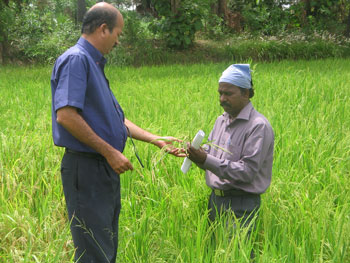
Inspection of seed production
One of the critical inputs required for organic farming is good quality organic seeds. Currently only chemically cultivated and treated seeds are available for farmers. Through this project, it has been proposed to produce organic seeds involving farmers to enable farmers to access good quality organic seeds.
Organic seed production was taken up in 175.38 acres in Kancheepuram, Ramanathapuram, Dindigul and Nagapattinam districts. Under this component of organic seed production, certified organic seeds and truthfully labelled seeds (TFL) were produced. Inputs like quality breeder seeds and foundation seeds of paddy varieties, groundnut, black gram and sesame, organic inputs like green manure seeds, neem cake, biofertilizers, vermicompost and mechanical traps were distributed to the beneficiaries.
1.1. TRAINING ON SEED PRODUCTION
Trainings on certified seed production were conducted for the farmers as well as for the staff involved in monitoring farmers’ fields to enable them to guide the beneficiaries. Apart from classroom sessions, on farm training on removing of off-types and other practical techniques were also provided. The Assistant Director of Agriculture (Seeds), the Seed Certification Officers and Inspectors were resource persons for these trainings.
1.2 RELEASE OF CERTIFIED ORGANIC SEEDS
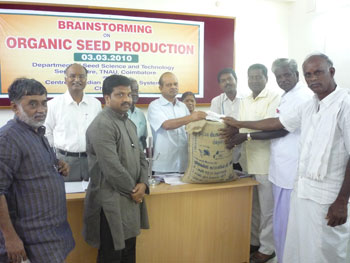
CIKS in collaboration with Tamil Nadu Agriculture University (TNAU), Coimbatore organized a brainstorming meeting on organic seed production on 3rd March 2010. During the meeting, the organically produced certified paddy seeds of ADT 43 variety which was produced by CIKS was released by the Registrar of TNAU. The release of seeds was hailed as a historic occasion as it was a first time in Tamil Nadu that the seeds with double certification were available commercially.
2. CONVERSION TO ORGANIC BY PROVIDING INPUT SUPPORT AND CROP LOAN
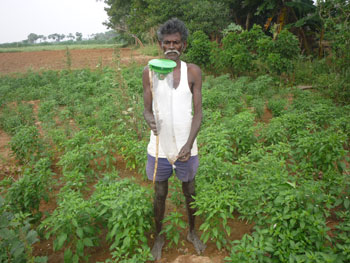
Farmer setting a pheromone trap in his field
During the period of conversion to organic farmers, require support in the form of quality inputs and crop loans for conversion. Under this component, a total of 410.04 acres have been identified from all the four districts for conversion to organic farming by providing input support and crop loan. Inputs like neem cake, biofertilizers, vermicompost and mechanical traps were distributed. Crop loans have been provided for the cultivation in 199.97 acres and for establishing vermicompost production units in Nagapattinam district. Under these schemes, crops like paddy, groundnut, chilli, tomato, sesame, sunhemp, pulses, cereals, cotton, ragi etc., have been cultivated.
3. ORGANIC FARMING DEMONSTRATION FIELDS
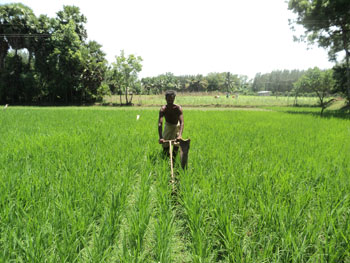
Weeding using cono weeder in demo field
Demonstration fields were established in 24 acres in Kancheepuram, Dindigul, Nagapattinam and Ramanathapuram districts. This is to disseminate various techniques of organic farming to a wide range of farmers in and around the beneficiary villages. Demonstration of various organic farming technologies like preparation and application of plant growth regulators, using pheromone traps and mechanical traps for pest control, preparation of vermicompost and compost, Azolla cultivation, collection and usage of cow’s urine, using farm ponds for irrigation etc., were done.
II. CREATING AN ENABLING ENVIRONMENT
To create an enabling environment to do organic farming, activities like training programmes, exposure visits, participation in agri-exhibitions and fairs, conducting food festivals etc., were taken up.
1. TRAINING PROGRAMMES
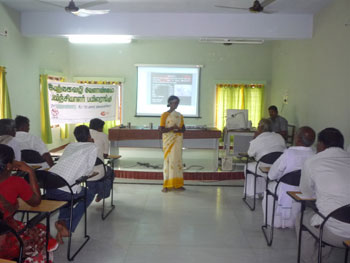
Participants of the Trainers Training Programme
To build the capacity of the beneficiaries on organic farming and related technologies training programmes were conducted. A total of 37 short-term training sessions on various organic farming technologies were conducted. A total of 117 farmers including 32 women farmers have been selected from all the four districts. For them, 18 trainers training sessions on soil fertility, non – chemical pest and disease management, organic crop protection methods, preparation of biopesticides, organic farming technologies, organic paddy cultivation etc. were conducted.
2. EXPOSURE VISITS
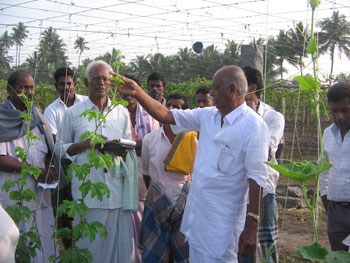
Farmers participated in exposure visit to organic farms
The beneficiaries under this project were taken to visit organic farms and fields, input production units, paddy processing units, Agri exhibitions etc. The main objective of these exposure trips was to expose beneficiaries to best practices and techniques in organic farming. Farmers were also taken to visit other NGOs, Agriculture Universities and to farms of well known organic farmers in Tamil Nadu.
3. PARTICIPATION IN EXHIBITIONS
To disseminate the importance and technologies of organic farming to a wide range of people and to raise sufficient consumer awareness about organic farming and its benefits we have participated in agricultural fairs. We have participated in Anu – 2009 NESCO Carnival (Nuclear Employees Sports and Cultural Organization) at Kalpakkam in Kancheepuram district and in the Dinamalar Agri Expo – 2010 organized in Trichy.
4. FOOD FESTIVALS ORGANISED
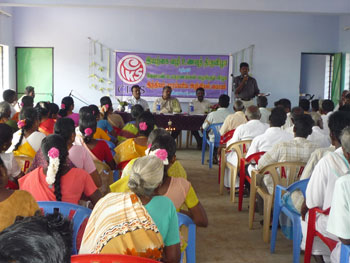
Participants of the food festival conducted in Dindigul district
We had organized traditional food festivals at Sirkazhi in Nagapattinam district and at Dharumathuppatty in Dindigul district. The main objective of this was to create awareness about the importance and nutritional value of traditional and organic foods. More than 550 farmers participated. The participants were served with different traditional dishes. There were stalls with displays of medicinal herbs, traditional paddy varieties, value added products, organic products, biopesticides and millets. The chief guests of the occasion were Bank Managers, Officials of Horticulture and Agriculture Departments, Scientists and village Presidents.
5. CAPACITY BUILDING OF NGOs / CBOs
As a part of this project, to strengthen the organic farming activities and to build the capacity of other NGOs, Centre for Improved Rural Health and Environmental Protection (CIRHEP) in Dindigul district and Gandhi Peace Keeping Centre in Nagapattinam district have been selected. A total of 11 trainings and two exposure visits have been conducted for them. Support has been provided for CIRHEP to establish vermicompost production unit in its research farm as a demonstration unit of vermicompost for the farmers in and around Nilakottai taluk.
6. INFRASTRUCTURE DEVELOPMENT
Under this project, infrastructures like a seed grading and processing unit, threshing yard and a training centre have been constructed. Biopesticide and vermicompost production units were setup in the beneficiary villages.
6.1 SEED GRADING AND PROCESSING UNIT
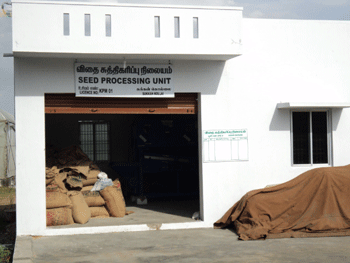
Seed processing and grading unit
A seed processing unit (500 sq.ft) with a threshing yard of 2500 sq.ft. have been constructed in Sukkankollai village. Regular processing and grading of seeds are in progress in the unit.
6.2. BIOPESTICIDE UNIT
In organic agriculture, the botanicals play a major role in the management of pests and diseases. To provide quality biopesticides of different types for various purposes, a biopesticide unit was constructed in Kattuemaneshwaram village of Ramanathapuram district.
6.3. TEMPORARY TRAINING SHED
Through this project, we have extended our work to a newer area – Ramanathapuram district. To conduct training programmes regularly for the beneficiaries in a common place a temporary training shed was established with necessary equipment and training aids.
6.4. DEMO VERMICOMPOST AND BIOPESTICIDE UNITS
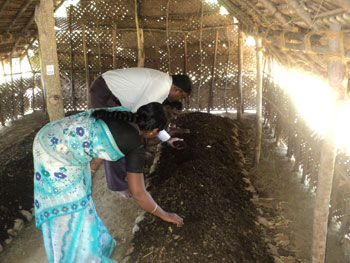
Vermicompost production unit of a beneficiary
To encourage farmers to get involved in the production of organic inputs and to develop community based production units support has been provided for biopesticide preparation and vermicompost production.
III. EDUCATIONAL MATERIALS
1. Calendar on Organic Foods

Calendar on Organic Foods 2010
A New Year Calendar on organic foods has been brought out. The importance of organic food and organic farming has been highlighted with catchy pictures and thought-provoking slogans with information.
2. Pesticides Basic Facts (Poochikolligal sila Mukkiya Thakavalgal)
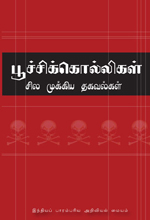
Publication on Pesticides – Basic facts
This publication in Tamil provides basic information on chemical pesticides. It also provides information on the status of pesticide usage in India, harmful effects and health hazards caused to human beings and animals, environmental pollution etc. It also discusses the alternative practices to avoid the use of chemical pesticides.
3. Organic Kitchen Gardening (Iyyarkaivazhi Kaikari Thottam)
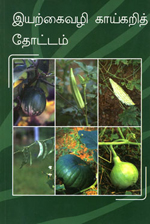
Publication on Organic Kitchen Gardening
This publication in Tamil focuses on how to grow vegetables in your garden without the use of chemical fertilizers and pesticides. It gives information about the importance and techniques of the preparation of compost. A section on laying out a vegetable garden is also provided. Cultivation details of some important vegetables are given. Description of pests and diseases attacking vegetables and their control measures are also provided.
4. Organic Paddy Cultivation (Iyyarkaivazhi Nel Sagupady)
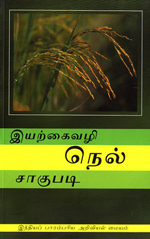
Publication on Organic Paddy Cultivation
This book provides detailed information on organic paddy cultivation. It provides information about seed selection techniques, seed treatment and use of organic manures to improve soil fertility. Pests and diseases affecting paddy are described in detail with their organic control measures. It also gives information on pests attacking storage grains and their control. Information about important indigenous paddy varieties with their special characteristics are also described in detail.
5. Pamphlet on Traditional Food (Parambariya Vunavu – Sila Thagavalgal)
An informative pamphlet on traditional food has been prepared and distributed during the food festival in Nagapattinam district. Information like characteristics of different food items, medicinal properties and nutritive values of foods are described briefly.
